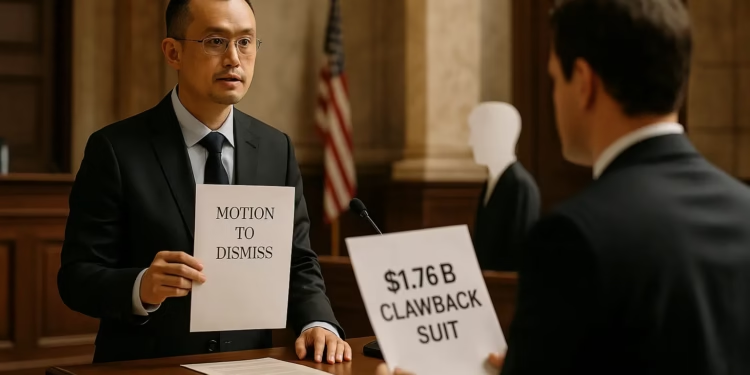Crypto investors and legal observers are closely watching as Changpeng “CZ” Zhao, founder and former CEO of Binance, has formally requested the dismissal of a $1.76 billion clawback lawsuit filed by FTX’s bankruptcy estate. The CZ lawsuit dismissal centers on a 2021 equity buyback deal that Zhao argues falls outside the scope of U.S. jurisdiction, given its offshore nature and involvement of non-U.S. entities.
Filed on August 4 in the U.S. Bankruptcy Court for the District of Delaware according to a report by Bloomberg Law , the CZ lawsuit dismissal motion contends that U.S. bankruptcy law cannot be applied to a transaction conducted between foreign entities and individuals residing outside the United States. The filing is the latest development in the prolonged legal aftermath of FTX’s dramatic collapse in 2022, which continues to shake investor confidence across the digital asset ecosystem.
Binance–FTX share deal under scrutiny
At the heart of the CZ lawsuit dismissal is a July 2021 transaction in which FTX allegedly paid $1.76 billion to repurchase equity from Binance. The deal was reportedly executed through Alameda Research, FTX’s trading arm, and involved a series of fund transfers between offshore entities registered in the British Virgin Islands, Ireland, and the Cayman Islands.
FTX’s current management, tasked with recovering assets for creditors, has argued that the transaction was improper and seeks to claw back the funds through U.S. bankruptcy proceedings. However, Zhao’s legal team claims the transactions were neither initiated nor executed on U.S. soil, thus exempting them from U.S. jurisdiction.
“The alleged transfers were made entirely outside the United States, between foreign entities, and do not fall within the scope of U.S. bankruptcy law,” said a spokesperson for Zhao’s legal team in a statement to Bloomberg Law.
Jurisdictional battle and legal defense
In his motion, Zhao asserts that he is a resident of the United Arab Emirates and holds no significant ties to Delaware or the broader United States. His attorneys further argue that serving U.S.-based legal counsel on a foreign defendant does not establish adequate grounds for jurisdiction under existing U.S. legal frameworks.
The CZ lawsuit dismissal also positions Zhao as a “nominal counterparty” in the disputed deal. He claims that the legal complaint attempts to shift blame to him personally for FTX’s internal mismanagement and failure to safeguard customer funds.
“The complaint seeks to hold Mr. Zhao accountable for actions and decisions that were exclusively within FTX’s control,” said Zhao’s counsel. “There is no legal basis to apply U.S. law to this matter.”
This jurisdictional challenge could set a precedent for how U.S. courts treat foreign-based crypto transactions, especially in cases involving globally distributed exchanges and counterparties.
Legal fallout from the FTX collapse continues
The CZ lawsuit dismissal is only one piece of a much larger web of litigation tied to the collapse of FTX. In 2024, FTX’s bankruptcy estate filed a broader lawsuit against Binance and Zhao, citing reputational harm and seeking to recover lost funds.
Meanwhile, Zhao’s legal troubles in the United States extend beyond civil matters. In late 2023, he pled guilty to violations of U.S. anti-money laundering laws and was sentenced to four months in prison. Separately, Sam Bankman-Fried, FTX’s former CEO, is currently serving a 25-year sentence for orchestrating one of the largest financial frauds in modern history.
Two former Binance executives, Samuel Wenjun Lim and Dinghua Xiao, who were also named in the FTX clawback complaint, filed their own motions for dismissal last month, echoing similar jurisdictional defenses.
As the court reviews the CZ lawsuit dismissal, legal analysts say the ruling could have broader implications for the enforceability of U.S. financial laws in the international crypto arena.
“This case may determine whether U.S. bankruptcy courts can reach across borders in pursuit of crypto-related recoveries,” said Carol Van Cleef, a financial regulatory attorney specializing in digital assets. “It’s a test of jurisdictional limits in a highly decentralized industry.”











